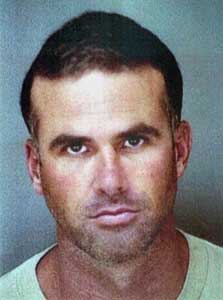By Elizabeth Hall
 |
| WANTAGH, NY - APRIL 15: An aerial view of police cars near where a body was discovered in the area near Gilgo Beach and Ocean Parkway on Long Island on April 15, 2011 in Wantagh, New York. Police have been conducting a prolonged search of the area after finding ten sets of human remains. Of the ten only four sets of remains have been identified as missing female prostitutes in their 20s who had been working in the online escort business. Police, working with the Federal Bureau of Investigation (FBI), suspect that a single serial killer may be in the New York area focusing on sex workers. (Image credit: Getty Images via @daylife) |
Serial murder investigations are the hardest for investigators to undertake because of the complexities involved with the task. Along with the multijurisdictional problems that often accompany these types of cases, killers usually choose people they do not know, as victims, and, the agencies are ill equipped to handle the investigation. These criminals, usually are very careful and have planned their crimes. They leave little or no evidence at the crime scene. It often takes a substantial amount of time before it has even been discovered, that a serial murderer is operating in the area because of cross-jurisdictional non-communication. Traditional police roles operate in a reactive fashion. This includes patrolling routinely, responding to calls immediately, and conducting investigations to follow up on cases. Serial murder investigations should be conducted, on both reactive and proactive fronts. There are programs and databases, which make this possible, such as VICAP, the National Victimization Survey, The Uniform Crime Report, the Behavioral Analysis Unit at the FBI, and the critical response group from the FBI. Added to the problems facing this type of investigation is the intense pressure that the media and public put on those personnel conducting the investigation to find a suspect. (Hickey, n.d.)
Serial killers rarely follow district lines, so in committing their crimes they usually cross juri
 |
| WANTAGH, NY - APRIL 15: An aerial view of the area near Gilgo Beach and Ocean Parkway on Long Island where police have been conducting a prolonged search after finding ten sets of human remains on April 15, 2011 in Wantagh, New York. Of the ten only four sets of remains have been identified as missing female prostitutes in their 20s who had been working in the online escort business. Police, working with the Federal Bureau of Investigation (FBI), suspect that a single serial killer may be in the New York area focusing on sex workers. (Image credit: Getty Images via @daylife) |
sdictions when they commit their crimes. In committing crimes like these, the killer effectively manages to disguise the nature of the crimes being serial, due to most jurisdictions do not share information with their neighboring departments. Therefore, the separate agencies involved do not connect the dots and realize that instead of having several unrelated homicides with several suspects, what they really have is several connected murders with one or two suspects. (Hickey, n.d.) When it is finally realized, the separate agencies may bicker about who gets to take the lead because of budgeting concerns. In traditional reactive policing, the normal order of investigation to follow up on cases may not be enough. A task force must be formed, with decisions on who must perform each task assigned. One of the most important assignments is that one person must be the only contact that the media has with information about the case. This reduces the likelihood of sensitive information being leaked to the press. Other personnel involved with the case must be informed that they must not talk to the media, the family of the victim, or anyone else associated with the case about police information. Because of the high profile nature of the case, the chain of custody must be maintained extra carefully. (Federal Bureau of Investigation, 2005)
In 2005, the FBI held a symposium on serial murder. In recent years, the way that law
 |
| English: The Seal of the United States Federal Bureau of Investigation. For more information, see here. Español: El escudo del Buró Federal de Investigaciones (FBI). Para obtener más información, véase aquí (Inglés). (Photo credit: Wikipedia) |
enforcement looks at serial murder cases has changed. Law enforcement realizes that in order to catch this form of criminal, they must not only use the reactive methods that they normally use, but to come up with some proactive methods to stop their killing sprees. One of these methods has been in use for a while. When law enforcement realizes that they have a serial killer in their midst, they can call the Behavioral Analysis Unit(BAU) of the FBI, who can come up with a profile based on the killer’s behavior, MO, and clues left at the scene, which can help police identify the perpetrator. The purpose of the symposium was to give experts in the fields of psychology, law enforcement, and academia, among the many represented, a chance to talk out similarities and recognize the common elements that come into play when each of these fields meets serial killers in their profession. The international level of serial murder was also addressed because in attendance were representatives of 10 foreign countries who make their homes on 5 continents of the world. (Federal Bureau of Investigation, 2005)
Causalitywas discussed in the symposium. It was noted, “Serial murderers, like all human beings, are a product of their heredity, their upbringing, and the choices they made during development (Federal Bureau of Investigation, 2005).” The attendees established that “there is no single identifiable cause or factor that leads to the development of a serial killer. Rather , there are a multitude of factors that contribute to their development. The most significant factor is the serial killer’s personal decision in choosing to pursue their crimes (Federal Bureau of Investigation, 2005).”
 |
| English: FBI Mobile Command Center in Washington DC. (Photo credit: Wikipedia) |
The symposium also discussed investigatory practices, and which ones were best. During the
discussions on this subject, importance was stressed upon law enforcement agencies sharing information through the National Law Enforcement Teletype System, ViCAP alerts, and the Law Enforcement online systems to help accomplish this. By communicating within different agencies, a bridge has been gapped, creating a proactive measurement for law officers to use as a tool. Establishing a good working relationship with other departments before a crime like this would help to ensure that these programs succeed. The list of best practices defined by the symposium follows:
¶ Identification of a Serial Murder Series – most challenging
¶ Leadership – investigative and administrative responsibilities must be defined and clear.
¶ Task Force Organization –establish a lead agency and obtain representatives from all other agencies involved. Establish one contact for the media.
¶ Resource Augmentation –Investigator should decide when to utilize extra staff, the role of the administration is to provide that extra support.
¶ Communication – daily briefings, face to face meetings, and submitting ViCAP reports in a timely manner are of utmost importance.
¶ Data Management – all reports must be filled out at the end of each shift and turned in accordingly. Information should be on computer to allow easy sharing, and done in a standard format, case management tools should be used to keep data organized and for analysis. Books should be created and maintained on homicides for cross reference.
 |
| FBI analyst. (Photo credit: Wikipedia) |
¶ Analytical Tools – use of these can reduce the chance of key information going unnoticed.
¶ Medical Examiners/Coroners – they should also have a system of sharing information between departments. There should be one medical examiner per jurisdiction only working on a serial killer case.
¶ Administrative Issues - Items of evidence should be stored along with any records pertaining to the case should be kept as long as possible for any homicide cases remaining unsolved for 50 years.
¶ Training – all homicide investigators should be kept up to date on any advances in technology and tools for investigation.
 |
| English: FBI Mugshot of serial killer Cary Stayner taken by the FBI following his arrest by Agent Jeff Rinek at a nudist resort in Wilton. (Photo credit: Wikipedia) |
¶ Officer Assistance Programs – Officers participating in investigations like this should have adequate time off, mental health services, and regular debriefings as needed. (Federal Bureau of Investigation, 2005)
In conclusion, serial murder investigations, due to the complex nature of the crimes, both proactive and reactive tools of investigation are needed to complete an investigation of this scale. In recent decades, law enforcement is realizing the importance of communication with other agencies.
Databases must be managed efficiently, and steps must be followed to ensure a successful investigation.
References
Fede Federal Bureau of Investigation. (2005, August 29). Serial Murder: Multi Disciplinary Perspectives for Investigators. Retrieved March 09, 2010, from Federal Bureau of Investigation: http://www.fbi.gov/publications/serial_murder.pdf
Hickey, E. W. (n.d.). Serial Murderers and and Their Victims. Fresno: Cenegage Learning.
Siegel, L. (2007). Criminology: The Core (Third ed.). Belmont, CA, United States: Cenegage Learning.


















0 comments:
Post a Comment